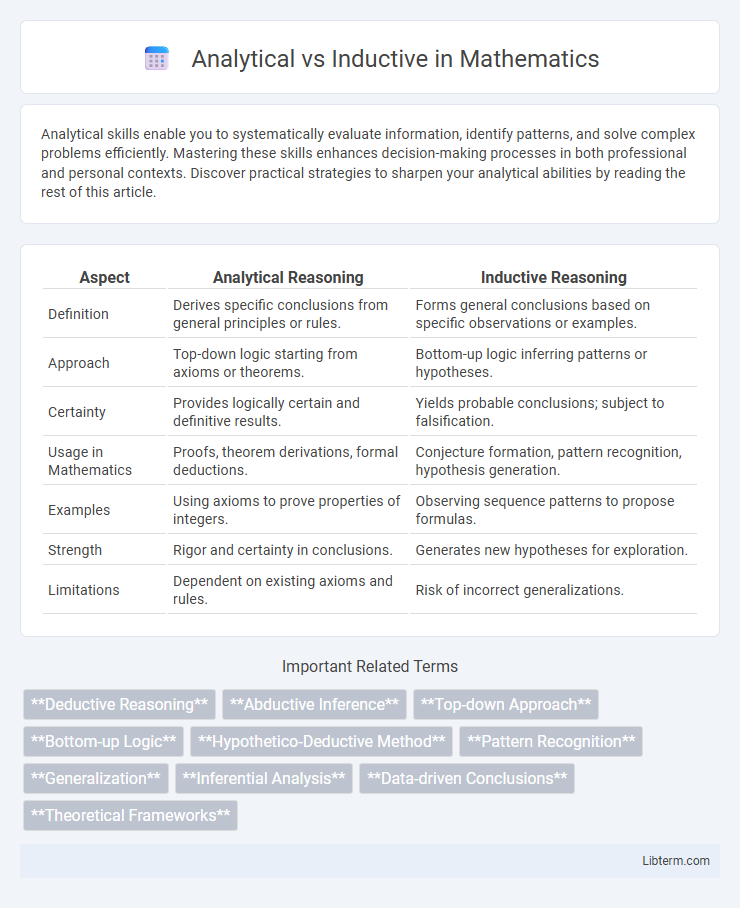Analytical skills enable you to systematically evaluate information, identify patterns, and solve complex problems efficiently. Mastering these skills enhances decision-making processes in both professional and personal contexts. Discover practical strategies to sharpen your analytical abilities by reading the rest of this article.
Table of Comparison
| Aspect | Analytical Reasoning | Inductive Reasoning |
|---|---|---|
| Definition | Derives specific conclusions from general principles or rules. | Forms general conclusions based on specific observations or examples. |
| Approach | Top-down logic starting from axioms or theorems. | Bottom-up logic inferring patterns or hypotheses. |
| Certainty | Provides logically certain and definitive results. | Yields probable conclusions; subject to falsification. |
| Usage in Mathematics | Proofs, theorem derivations, formal deductions. | Conjecture formation, pattern recognition, hypothesis generation. |
| Examples | Using axioms to prove properties of integers. | Observing sequence patterns to propose formulas. |
| Strength | Rigor and certainty in conclusions. | Generates new hypotheses for exploration. |
| Limitations | Dependent on existing axioms and rules. | Risk of incorrect generalizations. |
Introduction to Analytical and Inductive Approaches
Analytical approaches systematically break down complex problems into smaller components to understand their structure and relationships, utilizing logic and structured methodologies. Inductive approaches derive general principles from specific observations, emphasizing pattern recognition and empirical evidence to form broader conclusions. These contrasting methods are foundational in research and problem-solving, with analytical focusing on deduction and inductive prioritizing evidence-based generalization.
Defining Analytical Reasoning
Analytical reasoning involves systematically breaking down complex information into smaller components to identify patterns and relationships. It requires critical thinking skills to evaluate evidence, draw logical conclusions, and solve problems based on structured data analysis. This method contrasts with inductive reasoning, which builds generalizations from specific observations.
Defining Inductive Reasoning
Inductive reasoning involves drawing generalized conclusions from specific observations or evidence, allowing for probabilistic but not certain outcomes. It contrasts with analytical reasoning, which breaks down complex concepts into smaller components based on established principles. Inductive methods are fundamental in scientific research for developing hypotheses and theories from empirical data.
Core Differences Between Analytical and Inductive Methods
Analytical methods rely on breaking down complex data or problems into smaller, manageable components to understand their structure and relationships, often using deductive reasoning. Inductive methods focus on observing patterns and deriving general principles or theories from specific data sets, emphasizing empirical evidence. The core difference lies in analytical approaches starting with theories and testing them, while inductive approaches begin with data to form new theories.
Applications of Analytical Thinking
Analytical thinking is crucial in data science, enabling professionals to break down complex datasets, identify patterns, and develop precise models for informed decision-making. In engineering, it supports problem-solving by systematically evaluating technical specifications and constraints to optimize designs. Business analysts use analytical thinking to assess market trends, forecast outcomes, and devise strategies that enhance operational efficiency and competitiveness.
Applications of Inductive Thinking
Inductive thinking drives innovation in scientific research by enabling hypotheses generation from specific observations and experimental data. It supports decision-making in business analytics through pattern recognition and forecasting emerging market trends based on historical sales and consumer behavior. In education, inductive reasoning enhances critical thinking skills by encouraging students to infer general principles from particular examples or case studies.
Strengths of Analytical Approach
The analytical approach excels in breaking down complex problems into manageable components, allowing for precise identification of causative factors and systematic evaluation of each element. It leverages structured methodologies and quantitative data analysis to enhance accuracy and reliability in decision-making processes. This approach also facilitates clear documentation and replication of results, which supports rigorous validation and continuous improvement in diverse fields such as science, engineering, and business.
Strengths of Inductive Approach
The inductive approach excels at generating new theories by observing patterns and drawing general conclusions from specific data, making it highly effective in exploratory research and complex problem-solving. It allows flexibility and adaptability in understanding phenomena without preconceived hypotheses, enhancing creativity and innovation in data interpretation. This method supports the discovery of novel insights, particularly in qualitative studies where context and depth are crucial.
Choosing Between Analytical and Inductive Strategies
Choosing between analytical and inductive strategies depends on the nature of the problem and available data. Analytical strategies emphasize breaking down complex problems using established principles and formulas, ideal for structured data and clear relationships. Inductive strategies rely on pattern recognition and generalization from specific observations, making them suitable for exploratory analysis and incomplete or evolving datasets.
Conclusion: Integrating Analytical and Inductive Reasoning
Integrating analytical and inductive reasoning enhances problem-solving by combining structured, logical analysis with pattern recognition and generalization from specific observations. Analytical reasoning breaks down complex problems into smaller components, ensuring clarity and precision, while inductive reasoning builds broader conclusions based on empirical evidence and experience. This synergy fosters more robust decision-making processes, adaptable to both theoretical frameworks and real-world complexities.
Analytical Infographic

 libterm.com
libterm.com